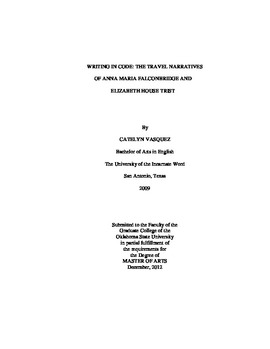| dc.contributor.author | Vasquez, Catelyn | |
| dc.date.accessioned | 2014-04-15T21:46:21Z | |
| dc.date.available | 2014-04-15T21:46:21Z | |
| dc.date.issued | 2012-12-01 | |
| dc.identifier.uri | https://hdl.handle.net/11244/9026 | |
| dc.description.abstract | An examination of the travel narratives of Anna Maria Falconbridge and Elizabeth House Trist reveals a commonality in rhetorical conventions for the purpose of writing to an audience other than the one explicitly assumed or named in their texts. The texts of these two middle-class, late eighteenth-century women writers reveals several commonalities in both content and writing style even though Falconbridge and Trist wrote and traveled hemispheres apart. Both women travel from their homes through the insistence of their husbands only to be widowed during the duration of their travels. Furthermore, Falconbridge and Trist create a female traveling persona in their writing in order to account for certain action or thoughts that would have been deemed immodest for middle-class, married women. During the late eighteenth century, middle-class female writers from both Europe and New England utilized rhetorical conventions such as apology in order to address a male audience, a process deemed "writing in code." This study focuses on how the intended audience of the narratives of Falconbridge and Trist was different from the explicit audience as well as the rhetorical strategies they employ to accomplish this task. Writing through a female persona, the content of their texts addresses their intended male audience while apology and humility provides the code to avoid overt societal scrutiny. This strategy allows for the publication of their narratives. Looking at both the private journal and epistolary forms of life writing, this paper argues that traveling women negotiated many roles including often the role of wife and that this gendered position resulted in a necessary writing in code within the texts to hide the authorial power claimed through the act of traveling and writing about the self during this century. Furthermore, applying a hemispheric methodology allows for the examination and comparison of narratives for two women writers in transit from vast distances apart. | |
| dc.format | application/pdf | |
| dc.language | en_US | |
| dc.publisher | Oklahoma State University | |
| dc.rights | Copyright is held by the author who has granted the Oklahoma State University Library the non-exclusive right to share this material in its institutional repository. Contact Digital Library Services at lib-dls@okstate.edu or 405-744-9161 for the permission policy on the use, reproduction or distribution of this material. | |
| dc.title | Writing in Code: the Travel Narratives of Anna Maria Falconbridge and Elizabeth House Trist | |
| dc.type | text | |
| osu.filename | Vasquez_okstate_0664M_12403.pdf | |
| osu.college | Arts and Sciences | |
| osu.accesstype | Open Access | |
| dc.description.department | Department of Foreign Languages and Literature | |
| dc.type.genre | Thesis | |
| dc.subject.keywords | anna maria falconbridge | |
| dc.subject.keywords | diary | |
| dc.subject.keywords | elizabeth house trist | |
| dc.subject.keywords | journal | |
| dc.subject.keywords | travel writing | |
| dc.subject.keywords | women's writing | |
